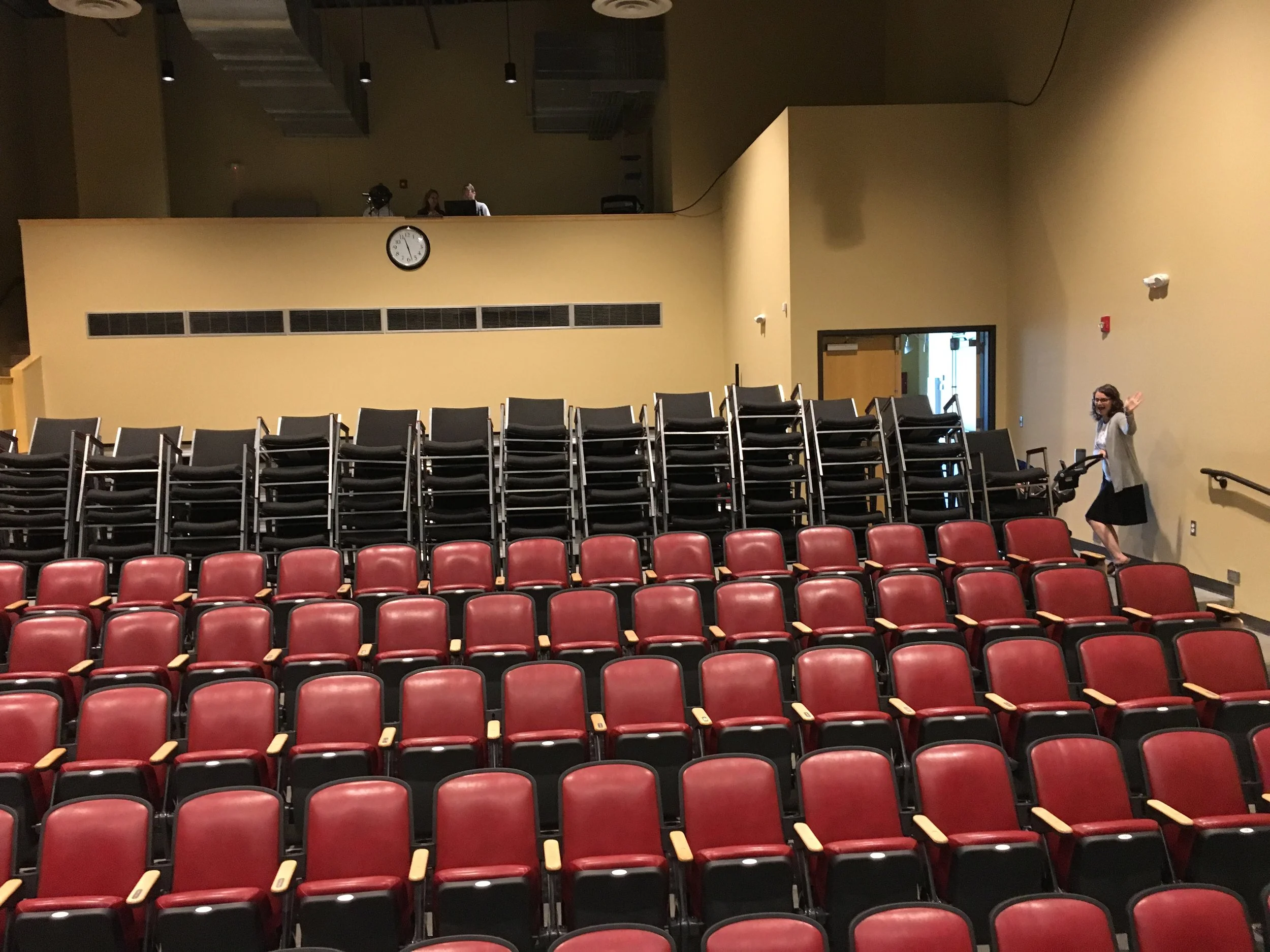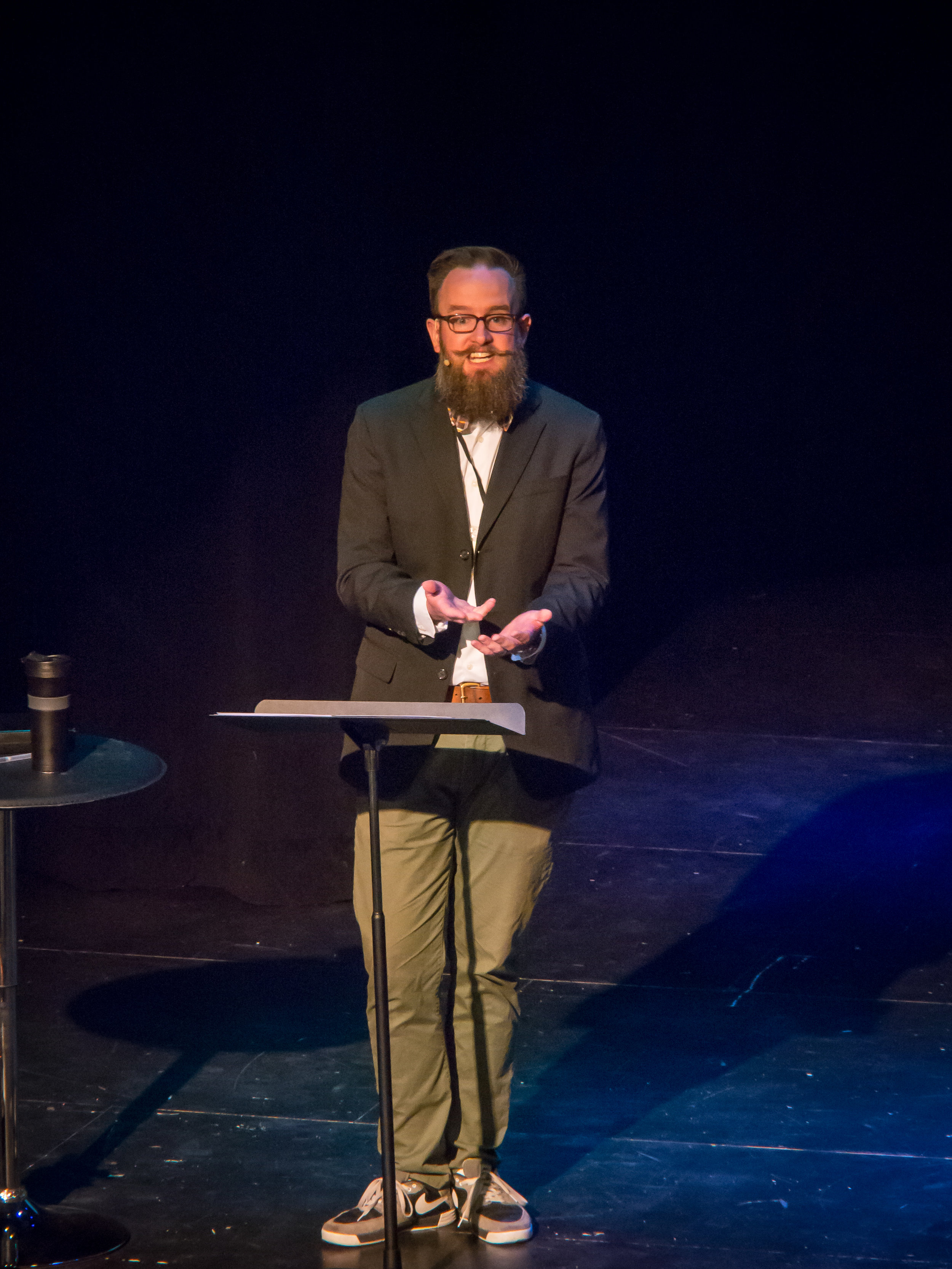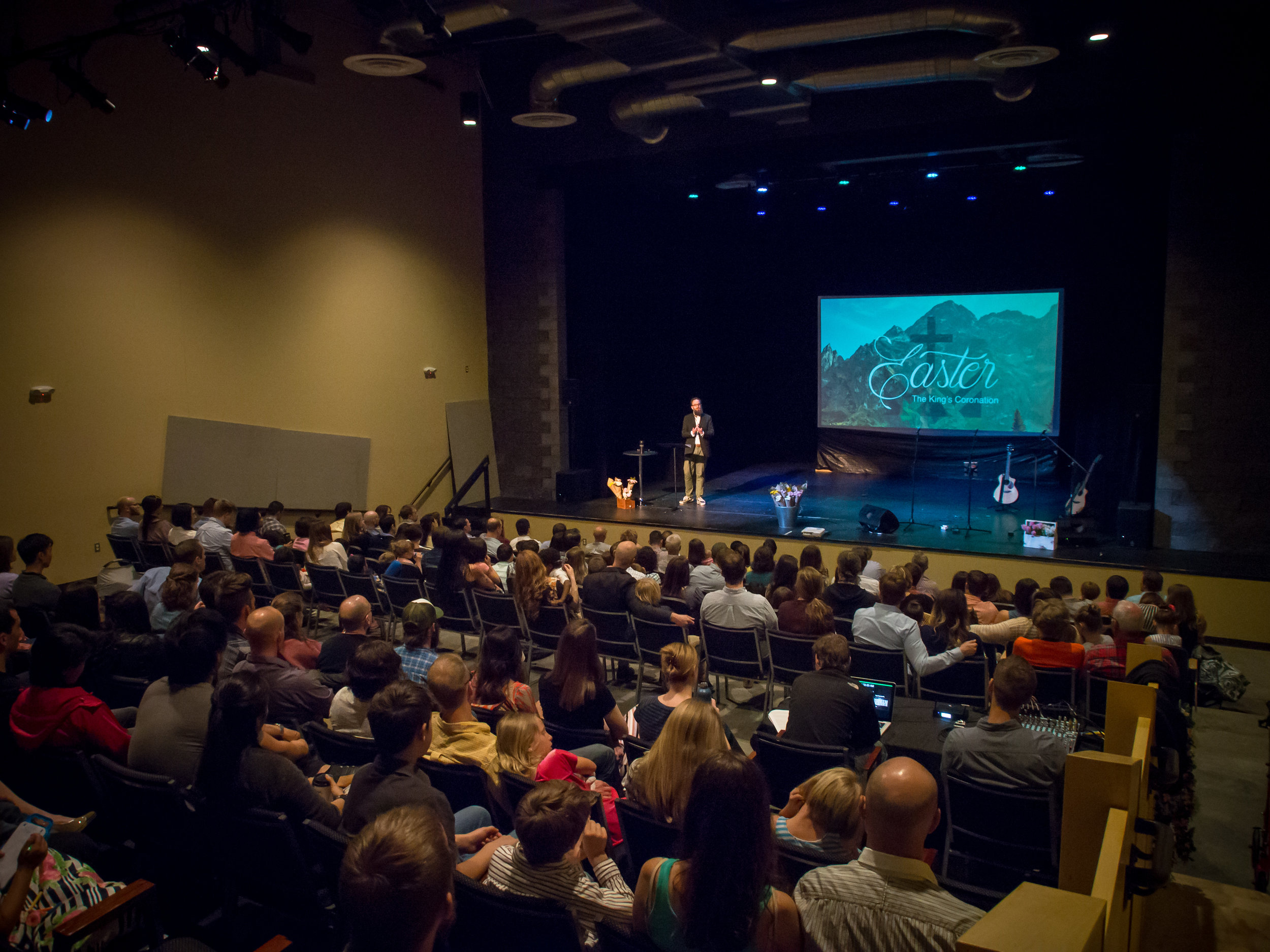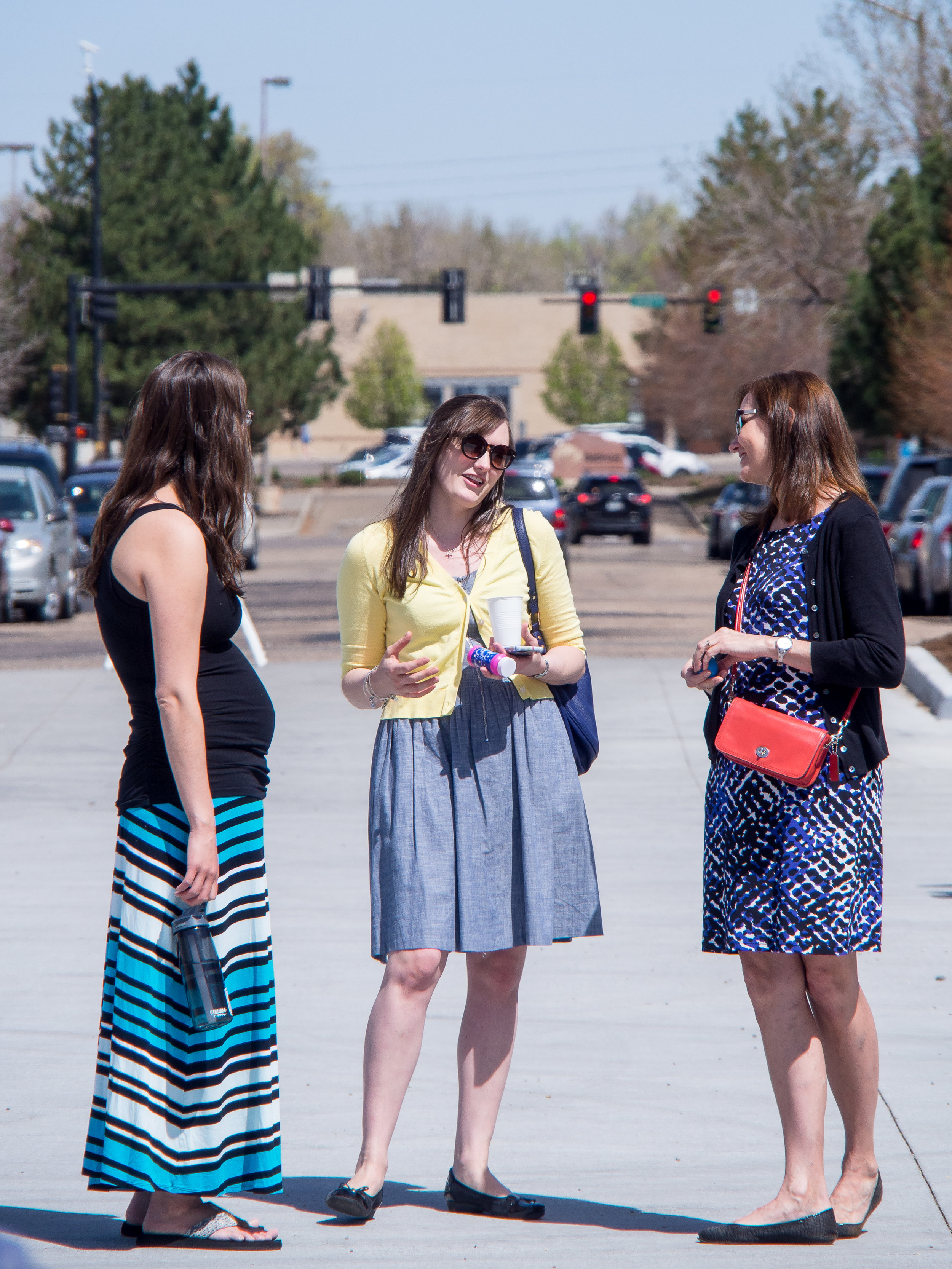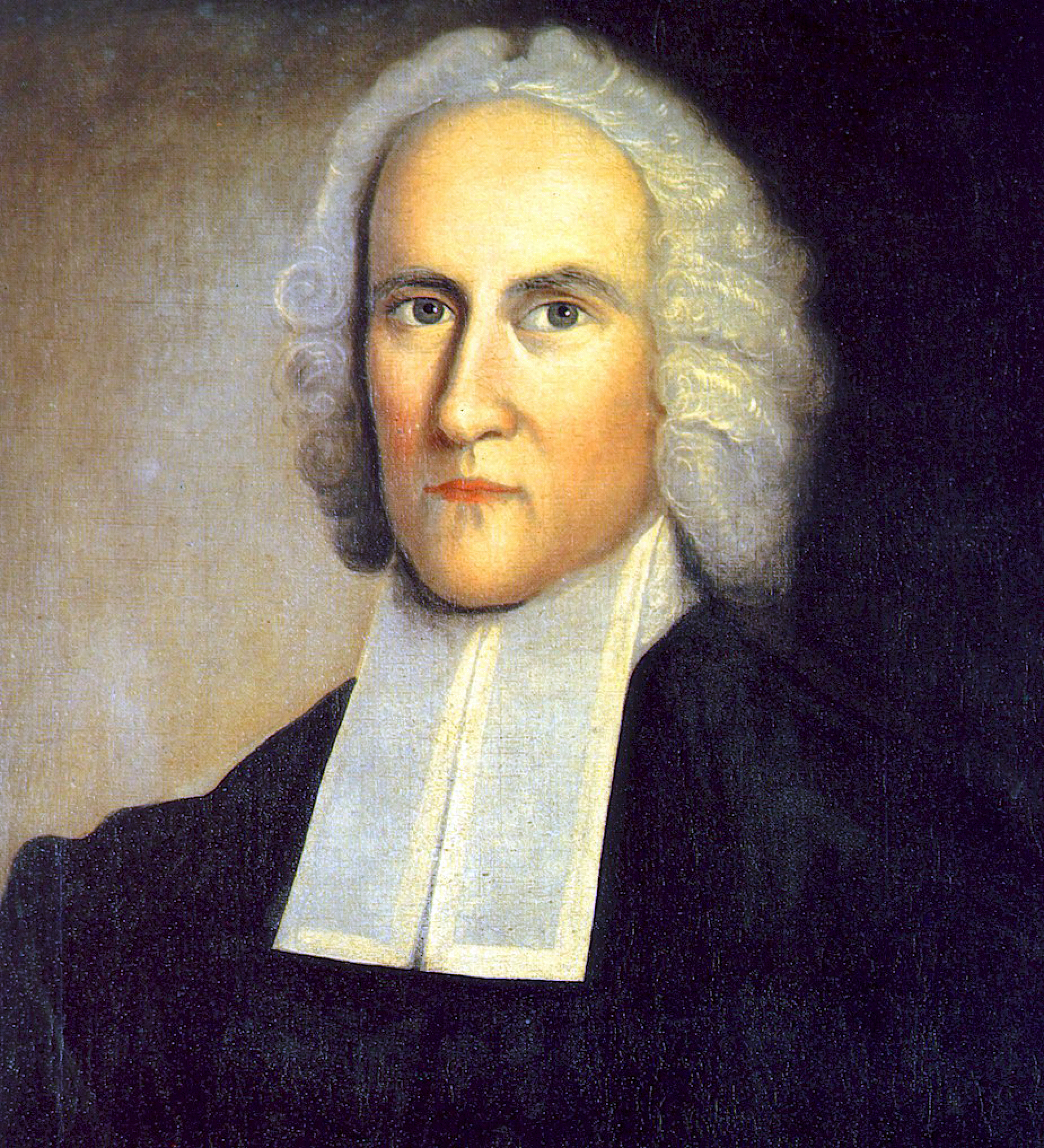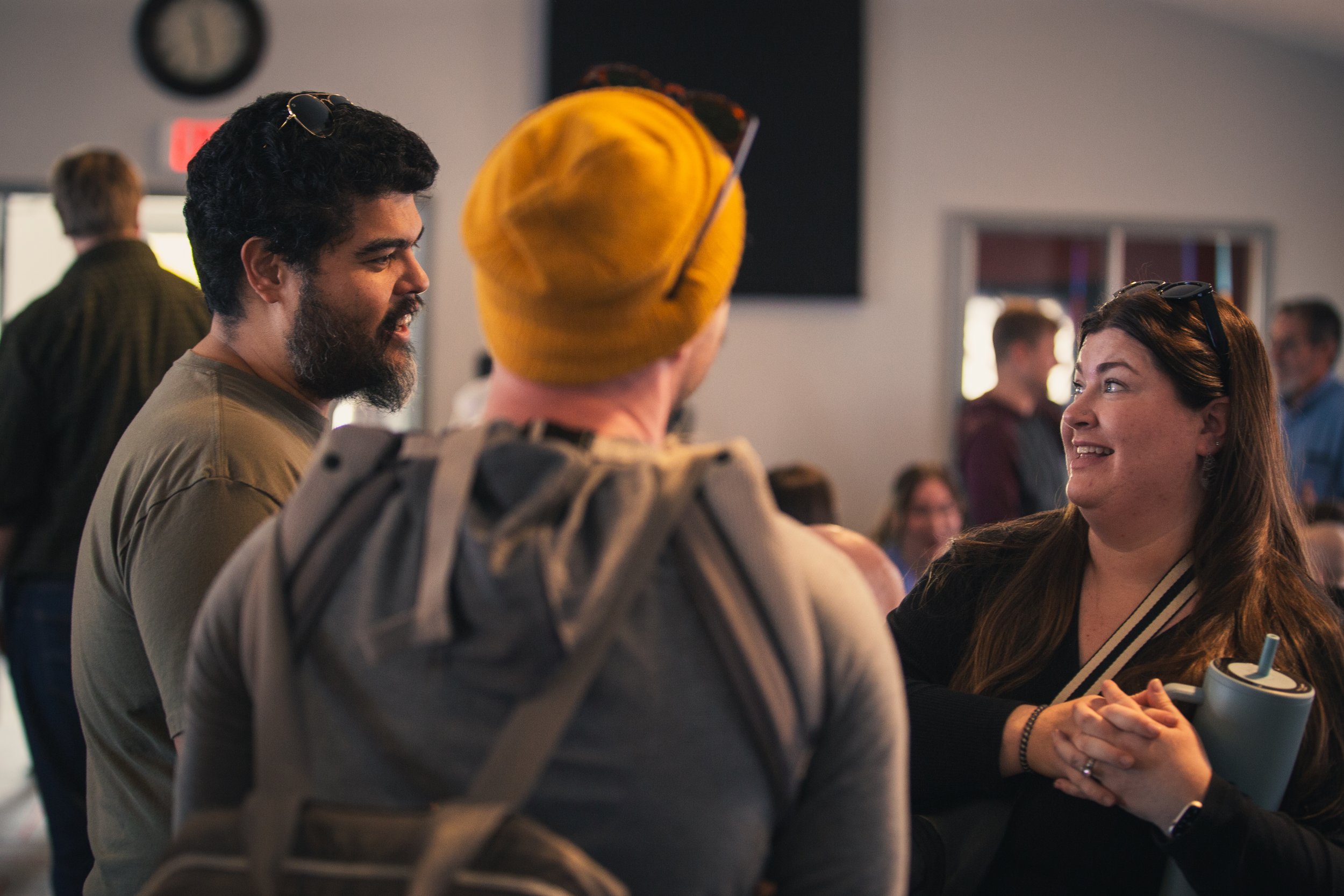
The Blog
Easter Sunday (2017)
Many thanks to all the volunteers, food trucks and The Art Underground for making our first Easter as a church a fun and memorable one! (Click for photo slideshow)
Many thanks to all the volunteers, food trucks and The Art Underground for making our first Easter as a church a fun and memorable one!
On Covenant Baptism (a.k.a. “Why we sprinkle babies.”)
During my first year at Covenant Theological Seminary, I joked with my dad that I’m doing so well that they named a building after me – the “Edwards” Building (it was a lame joke). In reality, it was named after the brilliant puritan preacher, Jonathan Edwards. His sermons are often studied in public schools for their literary genius alone. My bad joke led to me telling my dad about his life and ministry…
A quick disclaimer: A la our mantra that "you don't have to believe in order to belong," agreement with our convictions regarding infant baptism is NOT necessary for involvement, membership, or leadership (except Elders). The Table is exactly the kind of community where you are encouraged to examine and wrestle with your beliefs without pressure to conform, including this one!
My Family's Story
During my first year at Covenant Theological Seminary, I joked with my dad that I’m doing so well that they named a building after me – the “Edwards” Building (it was a lame joke). In reality, it was named after the brilliant puritan preacher, Jonathan Edwards. His sermons are often studied in public schools for their literary genius alone. My bad joke led to me telling my dad about his life and ministry…
“You know, I’m pretty sure we’re related to him.”
Come on, having the same last name doesn’t mean that’s the case!
My Dad then explained how, growing up, two framed prints of a man and woman from the 1800s hung in the stairwell of their home. The street lamp outside shone through the window at just the right angle to make it look like their eyes glowed, and he’d be too scared to go downstairs for a drink of water.
“In fact, I think I know where those pictures are…”
You’re kidding me, right…? Where?
We went into the garage, opened a box and… sure enough, he pulled out two antique-framed prints: one each of Jonathan and his wife, Sarah Edwards. He goes on to explain that my grandfather wrote a book called “The Edwardes Legacy” (the latter “e” was since dropped from the original Welsh spelling), and handed me a copy. I poured through it for the next few hours, tracing our family way beyond Jonathan Edwards, all the way back to likely illegitimate child of Henry VIII’s who became a key advisor to Queen Elizabeth and Professor of Divinity at Oxford University (a long story with lots of drama just waiting for it’s own BBC series). This was simply unreal.
It’s hard to explain how monumental of a revelation this was for me… I did not grow up in any church whatsoever and had only been a Christian 2ish years. Then I read that I’m among the 9th generation directly descended from the most brilliant and important philosophical theologian in American history. As incredible as all that was, it paled in comparison to an even more powerful revelation: of the 8 generations between Jonathan Edwards and I, my dad and maybe my grandpa (who passed away in 2006) are the only ones who are not Christian. Of those 6 Christian generations, 4 of them were pastors!
Suddenly, a few of the harder-to-swallow things I was learning in my 1st year at Covenant clicked into place, specifically: why Presbyterians baptize infants (hang with me here).
God’s Family Story
The Christian Bible describes a God who is faithful: not only to individuals, but also to families – including and especially children of believers (Genesis 17:7; Acts 2:39; 1 Corinthians 7:14; and Acts 16:31-33). The means by which God identifies His family in the Old Testament was circumcision, which transitioned in the New Testament to baptism (the Apostle Paul explicitly equates the two in Col 2:11-12). While babies can’t explicitly articulate their faith like an adult can, they know quite a bit about trust and faith at birth (Psalm 22:10), such that Jesus says a mature faith is… well… childlike (Luke 18:15-17).
Our Western Individualism clashes with the idea that an infant (utterly and completely dependent) would be considered part of God’s family before being able to choose for him/herself, but that’s not what adult baptism is about either! As one pastor I know has said, “Baptism is all about what He’s doing, not what we’ve done. It celebrates His initiation, His pursuit – what He has done for us and to us. ”
If our pursuing God is only because he first pursued us (Ephesians 1:4-5; 1 John 4:19), then it should not be at all surprising that He would consider our children to also be part of His family. Indeed, it should be the church’s assumption (not presumption) that our children are or will be Christians, and treated as such until proven otherwise. If that sounds crazy, just read Psalm 22:10!
So what?
There are countless and profoundly beautiful implications of infant baptism, but I want to focus on how this has impacted me personally... Jonathan Edwards was known to have regularly prayed for his family 7 generations deep. Here I am (the 8th), having not grown up in a Christian home and, only after starting my pastoral training, discover that I’ve unknowingly taken up the family vocation!
But did you notice something in all that?
Jonathan Edwards did not pray for me.
Rather than feeling left out, I am even more encouraged because it is a powerful reminder that God’s faithfulness does not depend on our faithfulness (2 Timothy 2:11-13). Yes, God answers and delights in our prayers, but primarily as a Father who longs to spend time with and bless His kids. He is faithful especially when we are not, and because we are not.
This is the theological heart of infant baptism! To baptize our children is to trust in God’s faithful, saving work, and not our own (or our children’s!) faithfulness. If grace is dependent on our choosing God, it is a contractual transaction and (by definition) not grace. Much like baby dedications in many reformed baptist churches (which we love, but doesn’t quite go far enough!), we do not baptize babies to guarantee or effect their salvation, but to entrust (with hopeful expectation) both them and our parenting to God’s faithfulness.
To baptize a baby is to formally include them in the very means of grace God has said he would use to redeem all Creation: the Church (God's family).
This Sunday, I will baptize my son: Jonathan Ransom Edwards (we call him "Ransom"). His name is not a coincidence, but a symbolic representation of this powerful truth. It is our hopeful expectation and assumption that he will one day make his own the Story that he has been born into – the Gospel story of God’s covenantal, generational and unconditional faithfulness.
Additional Resources
For a much deeper theological and practical exploration of Infant Baptism, please see the following articles (and/or shoot Brad an email to discuss it over liquid refreshment... preferably the kind that involves hops).
3 Things You Should Know About Easter
It’s that time of year again, when Cadbury Chocolate Eggs are sold by the millions and the History Channel starts airing a year’s worth of planned specials repackaging the same “shocking” and “newly-unearthed” claims riffing off of the same tired themes popularized by Dan Brown in The Da Vinci Code. With so many confusing messages about what Easter is all about, it’s no wonder we so easily miss the very reasons our broader society universally recognizes it as a holiday (even if many do not believe those reasons). As a helpful reminder and refresher, here’s why Easter is such a big deal for Christians…
Above: “The Incredulity of Saint Thomas” by Caravaggio, one of my favorite pieces at the St. Louis Art Museum.
It’s that time of year again, when Cadbury Chocolate Eggs are sold by the millions and the History Channel starts airing a year’s worth of planned specials repackaging the same “shocking” and “newly-unearthed” claims riffing off of the same tired themes popularized by Dan Brown in The Da Vinci Code. With so many confusing messages about what Easter is all about, it’s no wonder we so easily miss the very reasons our broader society universally recognizes it as a holiday (even if many do not believe those reasons). As a helpful reminder and refresher, here’s why Easter is so important to Christians…
#1 :: The Resurrection was an Historical Event
Why did the Christian faith spread across and subsequently convert history’s greatest empire in just a few hundred years if Jesus didn’t actually rise from the dead? Israel was the only nation/culture conquered by the Roman Empire that was not forced to worship the emperor as divine because their commitment to not worshipping any man as God was so zealous that Rome realized they would rather die than compromise… something as game-changing as the Resurrection would have to happen for such a dramatic reversal. As Tim Keller states in The Reason for God (p.209-210): “It was absolute blasphemy to propose that any human should be worshipped. Yet hundreds of Jews began worshipping Jesus literally overnight. The hymn to Christ as God that Paul quotes in Philippians 2 is generally recognized to have been written just a few years after the crucifixion. What enormous event broke through all Jewish resistance?”
#2 :: The Resurrection is Essential to the Christian Faith
Christians believe that sin (rebellion from God – the Source of all Life) is the source of all death. If Christ remained dead – both physically and spiritually – then He could not have been the Source of all Life (i.e. God incarnate). And if He was not God, then His death could not have possibly satisfied the punishment we deserve. It is for this reason that humanity’s greatest theologians like C.S. Lewis have claimed that the truth of Christianity does not rest on whether we like or agree with Jesus’ teachings, but on the reality of His resurrection. If you do not believe He rose from the dead, then it is utterly foolish to give His teachings an ounce of authority or credibility. His death and His resurrection are two sides of the same theological coin.
#3 :: The Resurrection Foreshadows Full Restoration
Easter does not merely demonstrate Christ’s divinity and power over death (though it certainly does), it is also a down payment on the promise He made to restore everything. The Gospel is not a “get out of jail free card,” but a trustworthy promise that God will be faithful to bringing about the renewal of all things – not merely our souls and not merely our selves, but nothing less than all of creation. He declared the physical world is good at the beginning of history, and He will settle for nothing less than it’s full restoration at the end of history. N.T. Wright beautifully articulates these dramatic implications in his book Surprised by Hope: “The point of the resurrection…is that the present bodily life is not valueless just because it will die… What you do in the present—by painting, preaching, singing, sewing, praying, teaching, building hospitals, digging wells, campaigning for justice, writing poems, caring for the needy, loving your neighbor as yourself—will last into God’s future. These activities are not simply ways of making the present life a little less beastly, a little more bearable, until the day when we leave it behind altogether (as the hymn so mistakenly puts it…). They are part of what we may call building for God’s kingdom.”
For further reading and exploration of Easter and the Resurrection, check out:
- Far as the Curse Is Found: The Covenant Story of Redemption by Michael Williams
- Surprised by Hope: Rethinking Heaven, the Resurrection and the Mission of the Church by N.T. Wright
- The Reason for God: Belief in an Age of Skepticism by Tim Keller
Spring Sermon Series
While I don't remember the first fantasy novel my dad handed to me, that's mostly due to how many dozens (if not hundreds) I devoured growing up. I vividly remember (in 4th or 5th grade) standing up the textbook we were supposed to be reading on my desk, and stealthily opening my new copy of The Horse and His Boy by C.S. Lewis behind it's protective screen. I remember it so well because, as it turns out, I was not half as ninja-like as I imagined and it was confiscated by my teacher just a few minutes later.
“Some day you will be old enough to start reading fairy tales again.”
Story Explains & Inspires
While I don't remember the first fantasy novel my dad handed to me, that's mostly due to how many dozens (if not hundreds) I devoured growing up. I vividly remember (in 4th or 5th grade) standing up the textbook we were supposed to be reading on my desk, and stealthily opening my new copy of The Horse and His Boy by C.S. Lewis behind it's protective screen. I remember it so well because, as it turns out, I was not half as ninja-like as I imagined and it was confiscated by my teacher just a few minutes later.
These stories resonated with my reality and infused my life with meaning: I wasn't just going to school, I was training for a life of honor, righting wrongs and protecting the weak. They had powerful implications on my life. They shaped and directed my hopes, dreams and plans for the future. Thus, it wouldn't be surprising to anyone who knows me that prior to becoming a pastor, my career path was exclusively and passionately directed toward becoming a Special Agent in one of several federal law enforcement agencies (as close to a real life modern knight as I could get). It is fact and not pride (ok, maybe a little), that I likely had the single most impressive resume of anyone graduating college and starting a career in that field.
Human beings are not computers. We do not fundamentally understand life and the world around us in terms of data, but in, as and through story. We cannot help but resonate with stories that both explain our reality and inspire our hopes. One reason why I so easily dismissed Christianity for most of my life was because almost every Christian I had met reduced the incredible true story of Jesus to a bullet-pointed list of mere doctrines that you had to believe in order to be "in" with God (never mind that God is the one who pursues us!). What I hadn't heard or experienced until after becoming a Christian, is how powerfully the true story of Jesus both explains my experience of reality and inspires my hopes.. far more even, than Arthur and his knights or Bilbo and his Fellowship.
Story Resonates & Transforms
On Easter, we'll wrap up our Cross & Crown sermon series with the climax of Jesus' resurrection. Although the Gospel of Mark ends almost immediately on that point, there is so much of that story left to tell. After His resurrection, Jesus shows his disciples that this is not the end of the story, but the re-beginning of the same true story God has been authoring since before time and cosmos began. It's not a man-made myth that resonates with our experience (though it does!), it's the redemptive history of humanity that transforms how we experience God, reality, and our part of the unwritten story to which we've been invited.
In other words, this epilogue to the resurrection story is the introduction to our life's story.
Over the 6 weeks between Easter and Memorial Day, we will dive into these stories and explore how they explain, resonate, inspire and transform our story. If, like me, you grew up more accustomed to Christianity being explained as a doctrinal checklist, you'll find this to be a hopeful and refreshing experience (or at least I hope so!). If your story has already been fundamentally transformed by the story of Jesus, we hope you'll find new depth and meaning in the true post-resurrection story of "Epilogue | Intro."
We're Hiring: Worship Arts Director (Half-Time)
Our much-loved founding worship director, Colin Stell, will be stepping down May 2017 to focus on family and a growing career. Thus, we are looking for a musically-gifted leader to grow and develop a team of musicians to lead us in worship on Sunday Mornings. As a part-time role in a quickly-growing church plant, we need a self-starter comfortable with ambiguity, creative risk-taking, and enthusiasm to work as part of a very close, tight-knit staff team. To apply...
Update #2: We have officially filled this position, thanks for your interest!
Update #1: We've significantly expanded the job description and compensation to half-time, with the intent of it becoming a full-time position once The Table grows to the point of being able to sustain that (sooner if able to raise support). The attached job description is also updated with expanded information about The Table, our Community, our new home at the Arts HUB, and our team's Philosophy of Ministry!
Our much-loved founding worship director, Colin Stell, stepped down last May to focus on family and a growing career. Thus, we are looking for a creatively-gifted leader to grow and develop a team of musicians to lead us in worship on Sunday Mornings. As a half-time role in a quickly-growing church plant, we need a self-starter comfortable with ambiguity, creative risk-taking, and enthusiasm to work as part of a very close, tight-knit staff team. To apply, please see the "Our Process" section of the Application Packet below.
Christmas Customs, Part 2 :: Waffles & Strawberries
For as long as I can remember, I’ve had waffles and strawberries on Christmas morning. Come hell or high water, not matter what else we did that day, we always launched the morning with this diabetes-inducing feast of carbs and sugar. Some years my dad made the waffles from scratch, others we just popped the Ego’s in our toaster (truthfully, I generally preferred the latter). It is a custom that...
For as long as I can remember, I’ve had waffles and strawberries on Christmas morning. Come hell or high water, not matter what else we did that day, we always launched the morning with this diabetes-inducing feast of carbs and sugar. Some years my dad made the waffles from scratch, others we just popped the Ego’s in our toaster (truthfully, I generally preferred the latter). It is a custom that I have continued ever since moving out, and intend to pass along to my kids as well.
I’m sorry, what’s that? You think waffles and strawberries for Christmas seems random and not all that special? Ahh, let me explain…
My great grandfather, Roy Benton Edwards, lived during the Great Depression. During the “dust bowl,” when the top soil of American farms across the country was finally used up and simply blew away with thousands of families’ livelihoods, he sold farm equipment. That’s right, he sold expensive farm equipment to the single poorest class of citizen during our country’s most dramatic economic free fall.
I never knew my great-grandfather, but he is spoken of as a near-legend in our family. He was “the kindest man you ever met,” and was so impacted by the love and grace of God that he beggared himself to help keep struggling farmers afloat – frequently without making a profit. When a family couldn’t afford to buy the equipment they needed to make a living, Roy would take out loans in his own name and buy the equipment for them, telling them to “just pay me back when you can.” Don’t get me wrong, very few families in that economy were flourishing, but there were also not many who lived so generously as that!
In the back of their house was a pretty modest strawberry patch. Every summer my great-grandmother would pick and can the whole lot of them. Because fruit out of season was impossible to come by (much less afford), they saved it especially as topping for pancakes on Christmas morning. In an age when no one could afford eggs, milk or meat, pancakes were an extremely cheap and daily meal that would fill your family’s stomachs, but not provide much in the way of nutrition. Strawberries were a rare treat, and one that transformed ordinary pancakes into an extraordinary delicacy. On a cold Christmas morning, in a house without heat, they would huddle around a feast fit for the King to celebrate His coming down to earth in a similarly cold manger, into a family also struggling to barely make ends meet…
The birth of a child, while undoubtedly special and cherished, isn't exactly uncommon… but flesh and blood birth of the Creator of the universe? Extraordinary! I don’t know when or why my family switched from pancakes to waffles, or if my great-grandparents saw a parallel between pancakes and babies, and strawberries and Christ, but for me it is a beautiful reminder of just how unfathomably special and unique the Christmas season is. This Edwards Family Christmas Tradition reflects both the extreme normalcy and historical uniqueness of Christ’s birth. My great-grandmother’s strawberries are the fruit of radical, sacrificial generosity. They point to a similar, if far more profoundly unconditional love of God made flesh.
Christmas Customs, Part 1 :: LIGHTS
We all have our holiday traditions and Christmas customs. Some are handed down through the generations, others are sparked afresh in that moment of beautiful inspiration. But how do they point to Advent and the birth of Jesus? During Advent, we’ll have a few stories and examples of how the customs and traditions we use to celebrate, sometimes unthinkingly, can be powerful ways of explaining the beauty of Christmas to our friends, family and children this Advent season. What are your traditions? How do they point to the birth of Jesus 2,000 years ago?
We all have our holiday traditions and Christmas customs. Some are handed down through the generations, others are sparked afresh in that moment of beautiful inspiration. But how do they point to Advent and the birth of Jesus? During Advent, we’ll have a few stories and examples of how the customs and traditions we use to celebrate, sometimes unthinkingly, can be powerful ways of explaining the beauty of Christmas to our friends, family and children this Advent season. What are your traditions? How do they point to the birth of Jesus 2,000 years ago?
In Christmas Vacation, Clark Griswold epically boasted of hanging on his house over “250 strands of lights, 100 individual bulbs per strand for a grand total of 25,000 tiny white lights” while his impatient family shivered in the cold. He (rather prophetically) dedicated their first lighting to the “Griswold Family Christmas” and behold… absolutely nothing happens. But of course, the problem is discovered and resolved, blinding the neighbors and restoring life as it should be.
So why do we even have this tradition? Where did it come from and how has it gotten so extravagant over the years?
Before electric lights first appeared in 1882 (not gaining popularity until the late 1930s), the tradition of decorating trees with lit candles (sounds safe, doesn’t it?) stretches all the way back to Germany in the 1700s. After the Protestant Reformation, the German bourgeois set up conifer tree displays decorated with edible fruits and candied nuts as an alternative to the “Christmas crib” (predecessor to the modern “nativity scene”) tradition in the Roman Catholic Church. “Legend has it” that the first candle-lit Christmas tree was set up by Martin Luther. While walking through the woods one night he saw a thousand tiny lights glimmering from a forest of evergreen trees and, upon closer inspection, realized it was actually the stars reflecting off newly formed icicles. So he cut down a tree, brought it into his living room and attached dozens of small candles to it’s branches to remind himself of the living presence of Jesus among us as the “light of the world.”
This reminded me of a far older “home décor” tradition originating in Exodus 12: 21-27 (click here to read the passage).
Jesus is the light of the world, the Passover lamb, the shining sacrifice that reconciles our relationship with God. Christmas lights, like lamb’s blood smeared on the door, are a visible public reminder and declaration that where light shines, darkness may not enter. When our children ask us why we decorate with lights, be it Christmas tree or suburban ranch, we have an opportunity to explain that “God is light, and in him there is no darkness at all” (1 John 1:5), and His living presence in us makes our hearts completely inhospitable to darkness.
Isaiah prophesied over 2,700 years ago that, “the people who have walked in darkness have seen a great light” (Isaiah 9:2). If you or someone you know are walking in darkness this Christmas season, find solace that the Divine Light has come as a beacon of hope to a hurting world. Though it may feel like night yet reigns in this world, the birth of Jesus on a cold winter’s night foreshadows a dawn that will never set. Just as the lights on our Christmas trees and homes push out the darkness and keeps the night at bay, so to do we have a Light that shines brighter than the sun, with a burning and brilliant love that can never be dimmed by time or threat. May He shine as a bright reminder of God’s love every time you see a tree or house twinkle with tiny lights.
"Have Mercy On Me"
If you have been with us these past few weeks on Sunday morning, you'll notice we've been singing a new song called "Have Mercy on Me." It's a reflection of Psalm 130 with confession & assurance (an element of our liturgy) specifically in mind...
If you have been with us these past few weeks on Sunday morning, you'll notice we've been singing a new song called "Have Mercy on Me." It's a reflection of Psalm 130 with confession & assurance (an element of our liturgy) specifically in mind: when we confess our need for grace to our Father in Heaven, we are asking for mercy and forgiveness, but we then also rest in the assurance of His steadfast love. He doesn't wait for us to confess before He gladly offers grace. No, we are loved so sufficiently and abundantly that confessing our needs, failures and sins become a means of seeing and experiencing that grace more fully. We know that we can then rest in that promise because of the person and work of Jesus.
Martin Luther famously said, “When our Lord and Master Jesus Christ said, 'Repent,' he willed the entire life of believers to be one of repentance.” To many, that might sounds pretty self-flagellating... but in reality, it is liberating. We are freed from being defined by past sins and failures, not because of anything we bring to the table (pun-intended), but because of Christ’s blood-bought invitation for us to approach his table. Whether we, as Christians, long for a posture of daily repentance or not, we can rest in the promise of Romans 8: "There is therefore no condemnation for those who are in Christ Jesus." We can approach the throne of God with confidence, walking in repentance, knowing that we are secure in the love of Jesus. What could be more liberating than that?
Thus, we are excited to release this song to everyone as a free download, and it is our prayer that it is a blessing to you personally, as well as very practically give you an opportunity to be familiar with a song we will regularly have in the rotation at The Table. Enjoy!
Free Download of "Have Mercy on Me"
Advent Devotional
This morning, I mentioned a devotional for those who were interested in walking through a daily reading, prayer and (for the REALLY ambitious!) activity for the whole family. You can download the main devotional...
This morning, I mentioned a devotional for those who were interested in walking through a daily reading, prayer and (for the REALLY ambitious!) activity for the whole family. You can download the main devotional in PDF form here, and the supplement (with activities) here. It's called "The Mothers of Christ" (walking through the stories and perspectives women listed in Jesus' geneology in Matthew 1:1-17) and includes detailed instructions on how to use it, if you've never done anything like this before! Here's a great excerpt/explanation of the meaning of advent to spark your digging into it:
“Advent” means a “coming” or “visitation.” That is exactly what we, as followers of Christ, are waiting for. This waiting frames our experience as Christians in the holy season of Advent. This practice of waiting for things of ultimate concern helps us prioritize life in an age obsessed with the temporality of the now and the new. This is truer in the month of December than in any other month, for our culture’s conception of these Holidays (Holy-days) is largely focused around what one will buy or be given. The Christian conception of this season begins with the realization that what, or who, we really want and need cannot be bought and is not “just a click away,” but must be waited for with patience, submitting to God’s timing, embracing our limits and finitude.
During this season, we rehearse the dramatic plot of scripture, going back in time to revisit the story of God’s creation of the world, its devastating Fall into sin and misery, and His plan to “visit and redeem” his people in the Messiah. In doing so, we find our place within God’s story as a people living in the already and the not yet. We know the Messiah, we know where the Story is going, and so we acutely know how unfinished it really is. So we look and love into a world with a holy impatience, wanting our hearts to mirror the King’s and longing for the earth to mirror His Kingdom.
Many thanks to Redeemer Presbyterian Church in Winston-Salem, NC for creating this outstanding resource!
A Pastoral Reflection on the Election
As a pastor, I cannot tell you how agonizingly difficult it is to avoid (even accidentally) binding consciences, while also speaking Truth with Love in the midst of controversies so desperately needing (and lacking) in both. How do I serve our people and equip them with the Truth of God's discomforting Love, all the while checking my own unseen assumptions or finite perspectives at the door? Where is the line between prophetic truth-telling and complicit, silent agreement? I honestly don't know how to answer these questions, and anyone that says they have a simple one is either foolish or lying.
I'll be frank... I'm "feeling all the feels" today, less than 24 hours after Donald Trump became the President Elect. Just a few days ago, I wrote about civility and how the way leaders conduct themselves is as important as the substantive content/policy differences (which I will not even begin to engage with). One part of me is disturbed and concerned about the cultural/social implications of someone who unapologetically bragged about sexually assaulting women (among many other equally alarming issues) being voted into the highest office of the land. Another part of me is grateful for the reminder that no political outcome will ever satisfy our deepest longings. Still another part of me is radically humbled by the (now quantifiable) reality that millions of people across this nation feel voiceless and left behind by what others consider "progress." There is much to discuss there, but there are many who are far more qualified than I to speak into it.
As a pastor, I cannot tell you how agonizingly difficult it is to avoid (even accidentally) binding consciences, while also speaking Truth with Love in the midst of a public discourse so desperately lacking nuance, clarity or civility. How do I serve our people and equip them with the Truth of God's discomforting Love, all the while checking my own unseen assumptions or finite perspectives at the door? Where is the line between truth-telling and complicit, silent agreement? I honestly don't know how to answer these questions, and anyone that says they have a simple one is either foolish or lying.
If this is the situation in which we live, what do we do with it? Not coincidentally, the topic of this Sunday's sermon is the core value which informs all of our other core values: Gospel. "Gospel" literally means "good news." As such, I've been asking myself "where is the good news in the midst of this election season?" (Note: Don't hear what I'm not saying... I'd be asking that question no matter who was elected last night). It is always wise to ask what God may be doing, so long as our answer is held lightly. Thus, here are a few observations, lessons and opportunities for "good news" that I've been ruminating on (and holding lightly) over the last 24 hours...
1. The Word "Evangelical" Means Nothing Anymore (Especially to our Neighbors)
The church has paid (and will continue paying) the price of hypocrisy in the gap between Pulpit and Poll. For entirely too long, the Evangelical Church has taken politics seriously and Jesus lightly, rather than Jesus seriously and ourselves lightly. Too many have attached their voice, vote and hope to one political party rather than a Kingdom not of this world, resulting with a definition of "evangelical" that is on it's best day, inconsistent. If, in the same breath, we condemn the character disqualifications of one leader, yet sanctify even greater deficiencies in one who promises to represent us, why in the world should anyone take us seriously? As a label and as a brand (which it should never have been in the first place) it is dead... thank God. Instead, the church has an opportunity to accept and criticize policies with the nuance they deserve, to actually develop a distinctly Christian politic that is as diverse, civil, collaborative and committed to the common good.
It's time for some serious soul-searching and public repentance. We neglect it at our peril, yet are freed to do so for the same reason we shouldn't have found ourselves here in the first place: we are citizens of a heavenly kingdom and our King both represents and cares for us more than any politician.
2. The Supernatural Power of Hospitality
Last week, I had a brain-melting conversation with John Bryson (Founding Pastor of the incredible multi-ethnic church, Fellowship Memphis) where he offhandedly observed that, "A place's quality of food is proportional to the suffering their culture has endured." Why do you think that is? I asked. "Because for many people, the only safe place they experience on a regular basis is around the dinner table." The division and polarization brought out by this election will never be solved by getting the right person in office, but by the other-serving love expressed through communities of radical hospitality. As Mark Dunkelman described in his TED Talk about why our politics are so broken, "There's a big chasm between thinking that the person who is sitting across the table from you (is wrong) and thinking that they are totally whackadoodle... If they're just wrong, maybe there's a chance of working out a deal. If they're whackadoodle, there's no chance. Can't do it."
If we lack civility, understanding and/or compassion, it is because we are acutely disconnected from our neighbors and (especially) those who think/feel/believe/behave differently than us. I am increasingly blown away by how needed our last Vision Night was (watch the video if you have any doubts), and increasingly amazed/humbled by how much our fledgling community is already having an impact through exactly this passion.
3. The Church is God's "Plan A," and There is No "Plan B"
In the midst of seeing both discouragement and elation, both despair and celebration, I am only more certain that Jesus - through His broken-but-beloved family - is the Hope of the World. We long to be a "community where you don't have to believe/agree/conform in order to belong," and that better include our vote for president... no matter who he or she may be. I am ecstatic, not dismayed, for the opportunity to practice what we preach. I am convicted of the need to know and be known by each and every one of my neighbors, to understand what makes them tick, to love them as Jesus loves me. Can you imagine the impact of a whole community fueled by the love of our Divine Host?
4. The Gospel is at Stake... and How We Grow.
Genocide survivor, pastor and theologian Miroslav Volf says it more fully and eloquently than I ever could: "Forgiveness flounders because I exclude the enemy from the community of humans even as I exclude myself from the community of sinners." No matter what side of the vote you fall on, this is an opportunity to become more fully human, not an impediment to it. Where we exclude anyone (nevermind those who even remotely qualify as "enemy") from our community, is where we most need to be reminded that Jesus died for his enemies (Rom 5:6-11) - us. While that reminder may at first discourage, it will also be our reservoir for love and grace whether we receive it from others or not.
With this "good news" in mind, I pray we are neither puffed up nor despair over this election. Jesus does indeed still sit on His throne, but that is not a trite silver lining for shrugging shoulders and "moving on." It is the basis of hope that fuels a greater love and peace than we can ever reasonably expect from any government, any politician or any president.
Peace,
Brad


